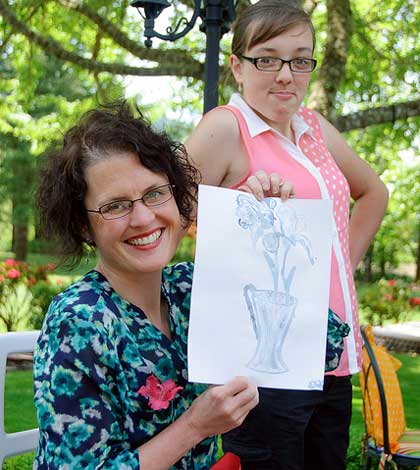Understanding Teenagers

“While we try to teach our children all about life, our children teach us what life is all about.”
Similarly, the role of a parent also changes from providing the basic protection, nurturing care and instructions, to the role of preparing the child for independence, and the ability to survive in the world outside the family. The parenting style at this stage changes to provide negotiations, contracts, and advice to their teenage children.
Every family goes through stress and conflict as children grow into their teens- it is a normal part of growing up. Problems like mood swings, revolt, snotty attitudes, cluelessness and a wide range of emotions are part of the growing experience. The expectations of parent’s and the teenager’s inability to live up to them are the major sources of disagreement.
Understanding teenagers better when their emotions are “out of control”, leads parents to lesser conflicts with them. You must know the below mentioned guidelines for different ages.
·11-12 years – Can be very emotional and moody. Their self-esteem may take a sharp drop that returns back when they are 18 or 19 years.
·13-14 years – Can be excitable, irritable, and more likely to explode than to control their emotions.
·15 years – Maybe more moody, withdrawn, and try to “cover up” their feelings.
·16-17 years – Often calm and settle down into a more adult pattern of behavior. They begin thinking about abstract ideas like love, honesty, and justice.
While understanding teenagers, you need to take care of the following.
1.Body
Teenagers feel closely connected with the way people feel about their body. They often feel uncomfortable about themselves and their body, if they think the general perception is not good. Girls begin changing inside as early as 7 years old, and boys as early as 9 years. Their physical maturity occurs long before emotional maturity, and the hormones that trigger growth can also cause mood swings.
The actual onset of adolescence is marked by puberty. Physical signs of puberty for girls begin with breast development and the onset of menstruation, while for boys it is their chest or facial hair, deepening of voice, and signs of increased awareness of sexuality. They have uneven growth in parts of their body that makes them clumsy and self-conscious.
Teenagers are more sensitive to weight and their general appearance. Their hands and feet grow much faster than their arms and legs. Parts of the face grow at different rates, and nearly all teenagers have skin problems like acne or “zits”, which are related to their hormone changes.
2.Stress
Teenagers feel unsecure about themselves and are convinced that everyone is looking at them. They want to look like and dress like other teenagers or their friends. They spend a lot of time worrying about how they look, and are often under a lot of stress. Teens believe in “magic” – that they will be protected from all the bad things that happen to others.
Growing teenagers have so much on their plates like sports, school, friends, and other teen drama. Adding in unfair, mean, or tough parents just adds to their stress. Teenagers need a supportive environment, along with well-structured, stable, predictable guidelines, as they are so unstable themselves. They experience less stress when their parents are loving, caring, clear, consistent, fair, and firm.
3.Spending Time
Teenagers may look grown up but they cannot think like adults, as they lack good judgment and maturity. They believe they are unique, and begin to reject the values and beliefs of their parents. They prefer spending time with their friends rather than their family, though once this stage passes by, most teenagers return to their parent’s values.
As a parent whenever your teens need you, make sure to be always ready to give them a friendly ear and hear them out.
4.Mood Swings
As per a Frontline report on the teenage brain – the problem of teenage mood swings is due to hormonal swings that affect the frontal lobe. This part of the brain is still growing in the teenagers to help them regulate their emotions and reactions to stress, thus it is not fully developed to contain the mood swings, but eventually it would all get alright.
You should let them be moody, restless, or sullen if they like, as they have ownership of their feelings and we cannot deny them their emotions. However, a line needs to be drawn if it makes everyone else miserable, if they turn disrespectful and do not wish to participate in the family or do the required chores.
As a parent, do not let mood swings scare you away and stop you from being a parent. You must continue to interact with your teenager and ignore the moodiness as much as possible.
5.Not Adults
Parent’s need to understand that teenager’s brains are still developing, and some parts of the brain that are responsible for planning, prioritizing, and logical thinking, will not be fully developed till they are into their 20’s. Thus, it can be tough to get through to your teen the importance of things like getting good grades, or preparing for college.
Understanding teenagers can be an uphill task, as they are a jumble of emotions. Their hormones keep changing and while they try to separate themselves from childhood and make their way into adulthood, it can be a very confusing and challenging experience for them. To be a positive parent, you need to understand the changes your child is going through and make things easier for them.
Even though there are some tough times while understanding teenagers through their growing stages, there are some delightfully fun and happy times that seem to make parenting teenagers worth all the trouble. As long as you love your teenager no matter what and how they are, and support them through their struggle and growing years, it will make their troubles and burdens that much more easier.
If you are a parent of a teenager, do share your experiences, the ups and downs you have faced during their growing years.











Hi Harleena,
Thank you for this insightful post. While my daughter is not a teen yet, I will say since she turned 7 there have been some changes in her behavior.. While she is becoming a bit more outspoken (in a good way) she has also starting to show signs of moodiness and I have no idea where this is coming from… But from your post I can see it’s all part of “growing up” with 7 being a critical age for girls…
Thanks, as always, Harleena for sharing such important info!!
Best,
Monisha
Hi Monisha – good to have you back after long 🙂
Lol…I can well imagine what you mean as I have two of my own, so been through their mood swings and all, though they are still in their teens, but crossed that phase. Yes, this is exactly the age when their behavior changes, moodiness creeps in, irritability sets in, arguments take place and a lot more. But it’s all a passing phase, that I assure you, so don’t worry!
She is just starting off as yet, and it would be another 5-6 years before she comes to this stage, so you have a lot of time, though girls mature sooner than boys, so their moodiness also sets in earlier as the hormonal changes start taking place. We’ve all been through this phase, but we forget our time, isn’t it?
Thanks for stopping by and sharing your experiences with us 🙂
LOL! This must be the easiest to write and the most difficult thing to actually do!
Understanding teenagers; just now I mentioned how teenagers are so smart nowadays. Though I ain’t experienced with kids; I must say you deal with the different realms beautifully. There is so much which I might have otherwise not even considered. One thing that work with cousins is treating them like adults. Teenagers feel they have grown up and they yearn to be treated with the same respect and the same attention be given to their thoughts and decisions. That works really well with them. But don’t expect them to behave like adults. They are still kids at the end of the day! 🙂
This is a topic which can be discussed on and on; would make for hours of conversations and we would still be clueless! 🙂
You are right Hajra!
Things are much easier said than done! And I can say a great deal about them as I have two of them, so my hands are surely full of experiences 🙂
Teenagers are at that junction in their life where they feel rather lost, as they really don’t know where they belong- whether they are to be counted as a child or an adult. And this is what causes many a problems at times. So often, my kids turn back and tell me that I’m smart to use them to get things done that kids do, while at other times ask them to behave like adults 🙂
Yes, you do have to deal with teenagers very differently as they have matured to a certain level, yet they want to see a friend in their parent. This is very essential if you really want to connect with your teenage child- to treat them as your friend, yet know that they are your valuable children needing much attention.
This is surely an ending topic for discussion, and those who are parents of teens would know best. But yes, each one of us have also undergone the teenage phase in our lives so can well relate to it.
Thanks for stopping by 🙂
Two teenagers; you must be on an energy drink addiction! 😉
We are four siblings; so there was a time when my mom had three teenager – 19, 15 and 14 and all girls! Imagine the pressure. She tells me those were her testing times! Because all three of us were different in so many ways and still the same! She still feels that handling each one in their own way was the challenge. There was no one strategy; each one has individual choices and thus different ways of handling it! 🙂
Ah…I marvel your mom to have handled all 3 of you together. But yes, my Granny had five daughters, and they didn’t have much of an age gap, so I keep wondering how she managed with 5 teens where each one had a different personality and wanted things done differently- and that in itself gives me the energy to carry on. 🙂
Understanding and dealing with teenagers are sure a testing times for parents, but it’s not that tough provided you know what to do.
Thanks for adding to the conversation. 🙂
Hi Harleena, I love this article!
I do believe to be the best we can be as parents will determine the outcome for our teenagers. It is a challenging part of life for teenagers, not a child, not an adult and not having the understanding to recognise how to manage themselves during this phase. Awesome insights!
Thank you.
Warmest Regards Shirley
Welcome to the blog Shirley!
Glad you loved the post and could relate to it!
You are quite right about being role models or the best you can, as parents for your teenagers- as they learn it best from their parents. The transition phase for teenagers, when they are neither a child, nor an adult is the toughest part. They are confused about things and don’t really know where they belong, and what is expected out of them. And as parents, we need to guide them and help them through this phase of theirs.
Thanks for stopping by 🙂
Teenagers today are hard to understand and being a parent is quite hard. I have brothers and sisters that are on the stage of adolescent and they are hard to understand. Once they did not get what they want, they will go out and leave the door. My parents allot enough time to them so that they will be open to everything they want to do and it helps them.
Thanks Harleena for sharing another topic that can inspire parents in understanding their teenagers.
Welcome to the blog Tracy!
Sorry for the late reply- I seemed to have missed your comment 🙂
You are quite right about teenagers being really tough to understand, and as parents- things are not easy for them either.
But as we have gone through the same phase when we were teenagers, if we take a little care and try fitting ourselves into their shoes, or try and think from their perspective- things can be worked out.
Parents need to be patient and understanding with their teen kids, and chalk out a way where they can sit and communicate with their kids. If that is done, there’s no reason as to why o your siblings would walk out of their door. And sometimes, it helps if you just listen to your teen kids and do things they want- rather than restricting or stopping them from doing everything.
Thanks for stopping by 🙂
Parenting is no easy task, I agree to that Sally!
I marvel your dedication and commitment to your children, being a single parent. It must have been very difficult to raise kids while shunting between so many jobs. You sure have come a long way!
Thanks for sharing your experiences as a parent Sally! Am sure other parents would learn a lot from you.
Child-rearing in itself needs parents that are actively involved in the kids lives. I found this so difficult when I was a young mother, because I was a single parent with 3 children under 5. Plus, I worked 2,3 & sometimes 4 jobs. When they were teenagers, I worked full-time evenings and went to nursing school during the day. Horrible schedule, but I'm grateful that God filled in the gaps for me and helped raise three wonderful children.
Thanks for stopping by to comment Sally! Parenting itself nowadays has become an uphill task, guess we all are so involved in our own lives, with little time left for children.
Yes, the teenage years are difficult, though we need to understand these teenage years, put ourselves in their shoes, become friends with them- to know more about them!
Thanks for sharing your experiences about your kids!
This is a very good article with a lot of good information. I have already raised my 3+(foster) children, but I wish I had had this info then.
The teenage years were very difficult, but we all managed. My children are such wonderful people and I'm so proud of them. I would recommend this to anyone who is, either now or later, raising teenagers. Sally
@ You're so right Fanny! Every parent qualifies as an expert on parenting in some way or the other- though we all may not be complete and perfect in that respect. The irony is that the most difficult vocation that is parenting, comes without any formal training. As you pointed out, one has to just rely on what one hears from the peers, self observations and experiences.
The other aspect of contrast is that we as parents sometimes do not understand our teenagers problems, in spite of the fact that we ourselves faced them when we were teenagers! There might be some degree of change in behavioral attitudes due to the generation gap, but the teenage problem at the core remain the same at all times. One major difference is that children today are more sensitive and demand more freedom – they want to be in charge of their lives, more than and earlier than we were, I guess.
I believe parents need to specifically address these concerns as the children enter into their teens, and handle them wisely. And you're right that the value-based parenting constitution should remain the same, except that the teenagers become eligible to be more proactive in the family as decision-makers. In the end, it is the love in the family that binds it – no matter what differences there exists. As parents we have to keep trying, with all expressive love and patience – and it will eventually make things work, sooner or later. Thank you very much for contributing your thoughts on teenagers and parenting.
With a 13 and a 15 year old, I think I qualify as an expert witness. A few points come to mind when I hear or read about the trouble of raising teens.
First, in my opinion, it is very important to realize that you don't start a brand new adventure when they hit their teenage years. On the contrary, whatever had value and was a reliable structure before, needs to still be there. The difference is that they don't get to be mere consumers of your educational program any more, they need to be an active and contributing party to it.
Second, they need to know that you might not always like them, but you will always love them. And in order to believe it, they need to hear it and experience it, over and over. Even if they pretend not to hear you, they very well do. So don't hold back.
Third, I think is the best part. As a parent we don't always know what to do since it doesn't come with a degree and all that, we have all heard it, and said it ourselves. But there is really nothing new about being a teenager, we can all be experts, we have all been a teenager. What we need to do is remember. Remember how we felt, how our parents reacted, what worked back then and what didn't.It's the one thing about parenting we have experienced before.
I might not be "out of the woods" yet, but I am pleasantly surprised at how proud I am when I look at my teens slowly turning into responsible, caring, wonderful adults.
A winding path is so much nicer to travel than a straight highway.